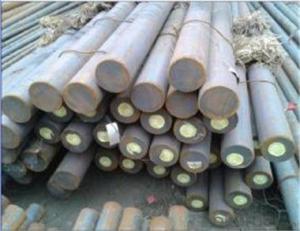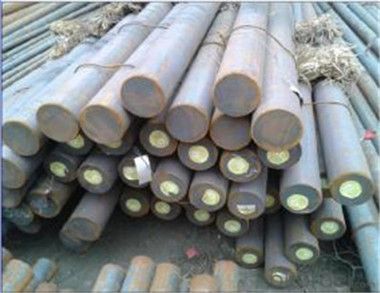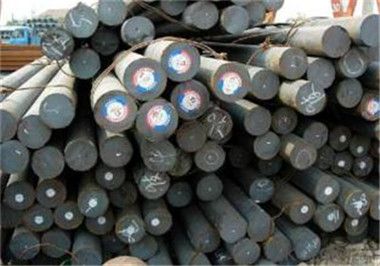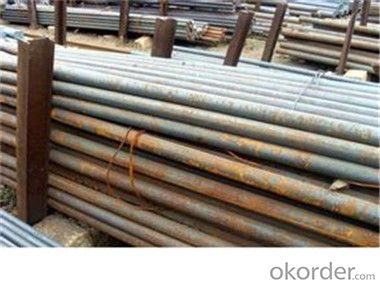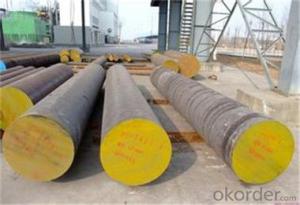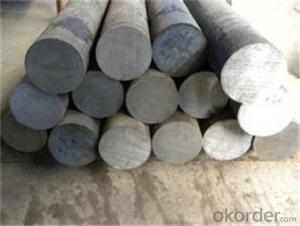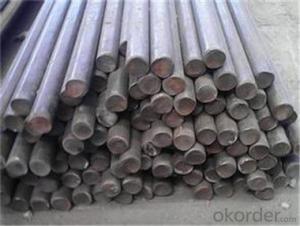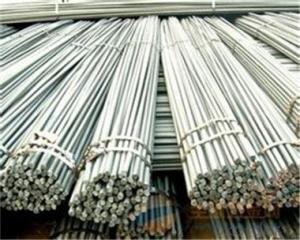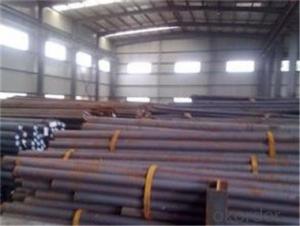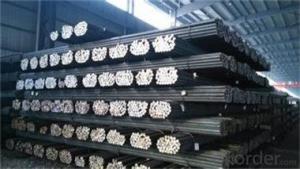Hot Rolled 12mm Steel Rod Price Steel Bar HRB400
- Loading Port:
- Tianjin
- Payment Terms:
- TT OR LC
- Min Order Qty:
- 888 m.t.
- Supply Capability:
- 2000000 m.t./month
OKorder Service Pledge
OKorder Financial Service
You Might Also Like
Specification
Description of steel round bar:
(1) Thickness of not more than 2MM sheet, efficient blanking die, punch die and pressure die etc.
(2) All kinds of scissors, inserts, woodworking blade.
(3) Thread rolling die and wear-resistant slider.It is used in the manufacture of a higher strength and higher quenching and tempering section.it can also be used for 2000m following oil well drill pipe joints and fishing tools,and can be used for bending machine dies.
Festures of steel round bar:
4340 Forged Round Steel Bar
1.Dia 80-800mm Length:2000-13000mm or as required
2.Technique:Forged
3.Delivery Time:45 days
Specifications of steel round bar:
Round bar | Diameter(mm) | Length (mm) | |
10~800 | 2000~5800 | ||
plate/sheet | Thickness(mm) | Width (mm) | Length (mm) |
10~800 | 80~2300 | 2000~5800
|
| Packaging Details: | 6mm-12mm : packing in coil with the steel wire. 10mm-32mm :strainghtness rebar in bundle with the steel wires , then loading directly . |
| Delivery Detail: | 20days after the order confirmed |
Images of steel round bar:
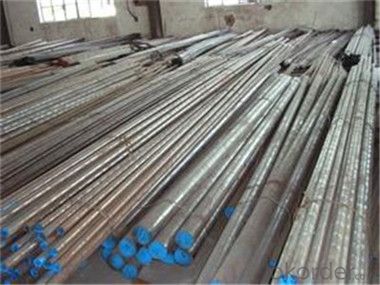
FAQ:
1. What is your package?
Packing situation: standard seaworthy packing or as customer required.
2. How long is the lead time?
Delivery time: 45 days after order confirmed.
3. What payment term do you accept?
Payment: T/T or L/C at sight.
- Q: Can steel round bars be used in the manufacturing of shafts?
- Yes, steel round bars can be used in the manufacturing of shafts. Steel round bars are often used as raw materials for shaft manufacturing due to their high strength, durability, and excellent mechanical properties. The round shape of the bar allows for easier machining and forming processes, making it suitable for creating shafts of various sizes and lengths. Additionally, steel round bars can be heat treated to enhance their hardness, strength, and wear resistance, further improving their suitability for shaft applications.
- Q: What are the different types of steel round bar alloys for improved machinability and strength?
- There are several different types of steel round bar alloys that are specifically designed to offer improved machinability and strength. These alloys are commonly used in various industries where the ability to machine components efficiently while maintaining high tensile strength is crucial. Some of the most popular steel round bar alloys for improved machinability and strength include: 1. 12L14: This alloy contains lead, which acts as a lubricant during machining, resulting in improved chip formation and reduced tool wear. It offers excellent machinability and good strength, making it suitable for applications that require intricate machining processes. 2. 4140: Also known as "chromoly" steel, this alloy contains chromium and molybdenum, which enhance its strength and hardenability. 4140 steel round bars are widely used in applications that require high tensile strength, such as automotive parts, shafts, and gears. 3. 8620: This alloy is a low-alloy nickel-chromium-molybdenum steel that offers a combination of high strength and good toughness. It can be easily machined and is often used in applications that require case-hardening, such as gears, shafts, and fasteners. 4. 1018: Known as "cold-rolled" or "cold-finished" steel, 1018 is a low-carbon steel alloy that offers good machinability and weldability. It is commonly used in applications where precise and smooth finishes are required, such as in the manufacturing of bolts, screws, and hydraulic fittings. 5. 52100: This alloy is a high carbon, chromium-bearing steel that is primarily used in the manufacturing of bearings and other high-wear applications. It offers excellent hardness, wear resistance, and machinability, making it suitable for components that require high strength and durability. These are just a few examples of the different types of steel round bar alloys available for improved machinability and strength. The choice of alloy depends on the specific requirements of the application, such as the desired strength, machinability, and durability. Consulting with a materials engineer or supplier can help determine the most suitable alloy for a particular use case.
- Q: What are the properties of steel round bars?
- Steel round bars have several properties that make them highly desirable for a wide range of applications. Firstly, they possess exceptional strength and durability, making them suitable for load-bearing structures and heavy-duty machinery. Additionally, steel round bars exhibit excellent corrosion resistance, allowing them to withstand harsh environmental conditions without compromising their integrity. They also have a high melting point and can withstand extreme temperatures, making them ideal for applications that involve heat or fire. Furthermore, steel round bars can be easily machined, welded, and fabricated, providing flexibility in design and construction processes. Lastly, they offer good dimensional stability and precise tolerances, ensuring consistent performance and reliability in various industrial and construction settings.
- Q: How do you calculate the cross-sectional area of a steel round bar?
- To calculate the cross-sectional area of a steel round bar, you need to know its diameter or radius. The formula for calculating the cross-sectional area of a circle is A = πr^2, where A is the area and r is the radius of the circle. If you have the diameter of the round bar, you can divide it by 2 to get the radius. Once you have the radius, you can substitute it into the formula to calculate the cross-sectional area. Keep in mind that the value of π is approximately 3.14159.
- Q: How do steel round bars compare to fiberglass or composite bars?
- Steel round bars and fiberglass or composite bars exhibit distinct differences in their properties and applications. Strength and Durability: Steel round bars possess exceptional strength and durability, boasting a high tensile strength that enables them to withstand heavy loads and stress. Conversely, fiberglass or composite bars possess a favorable strength-to-weight ratio but generally lack the same level of strength as steel bars. They may be more susceptible to bending or breaking under high pressure or impact. Weight: A significant disparity exists in weight between steel bars and fiberglass or composite bars. This contrast can prove advantageous in certain applications where additional weight is necessary for stability or to counteract external forces. Conversely, situations that prioritize weight reduction, such as in the aerospace or automotive industries, favor fiberglass or composite bars due to their lightweight nature. Corrosion Resistance: Steel bars are prone to corrosion, particularly when exposed to moisture or harsh environments. Consequently, they necessitate regular maintenance and protective coatings to prevent rusting. In contrast, fiberglass or composite bars inherently possess corrosion-resistant properties, rendering them suitable for applications prevalent in marine or chemical industries that often involve exposure to corrosive elements. Electrical Conductivity: Steel round bars boast electrical conductivity, which proves advantageous in specific applications requiring electrical grounding or conductivity. Fiberglass or composite bars, by contrast, are non-conductive and preferred in situations necessitating electrical insulation, such as in electrical installations or sensitive electronic systems. Cost: Steel bars generally offer a more cost-effective solution compared to fiberglass or composite bars. The abundance of raw materials for steel production contributes to their affordability in most cases. Conversely, fiberglass or composite bars involve intricate manufacturing processes and the utilization of specialized materials, leading to higher production costs. In conclusion, steel round bars are favored for their strength, durability, and cost-effectiveness, finding widespread use in construction, manufacturing, and infrastructure projects. Conversely, fiberglass or composite bars present advantages in weight reduction, corrosion resistance, and electrical insulation, frequently finding application in industries that prioritize these properties. The selection between the two hinges upon the specific requirements and conditions of the project or industry.
- Q: Cold drawn steel wire is a round bar or thread steel in Construction Engineering?
- Of course it belongs to round bar. Thread steel can not be obtained by cold drawing. Besides, the outer diameter of the cold drawn steel wire is smaller, the surface is smoother and the hardness is slightly higher.
- Q: What is the maximum elongation of steel round bars?
- The maximum elongation of steel round bars may vary based on the particular grade and composition of the steel. Nonetheless, typically, the maximum elongation for steel round bars hovers around 20-30% of their original length. Consequently, these bars can stretch or elongate by up to 20-30% before reaching their breaking point or ultimate tensile strength. It is worth mentioning that this maximum elongation is influenced by several factors, including steel quality, manufacturing process, and any heat treatment employed on the bars. Therefore, it is advisable to refer to the manufacturer's specific specifications and consider the intended application of the steel round bars in order to establish the maximum elongation for a specific case.
- Q: What are the different types of corrosion-resistant steel round bars?
- In the market, one can find a variety of corrosion-resistant steel round bars. The most commonly used types are as follows: 1. Stainless Steel Round Bars: Stainless steel is a popular choice when it comes to applications that require resistance to rust and corrosion. Its high resistance stems from the presence of chromium, which creates a protective oxide layer on the steel's surface, effectively preventing further corrosion. 2. Duplex Stainless Steel Round Bars: Duplex stainless steel is a unique type of stainless steel that combines austenite and ferrite microstructures in a balanced manner. This combination grants it exceptional corrosion resistance, high strength, and excellent weldability. 3. Nitronic Stainless Steel Round Bars: Nitronic stainless steel is an alloy known for its exceptional performance. It offers superior corrosion resistance, high strength, and good ductility. The presence of nitrogen further enhances its ability to resist pitting and crevice corrosion. 4. Alloy Steel Round Bars: Alloy steel refers to steel that has been alloyed with various elements in order to enhance its properties. Some alloy steels, including corrosion-resistant alloys (CRA), are specifically designed to withstand corrosion in harsh environments. These alloys typically contain elements such as chromium, nickel, and molybdenum. 5. Aluminum Round Bars: Although not technically steel, aluminum round bars are commonly used in applications where corrosion resistance is crucial. Aluminum forms a protective oxide layer on its surface, effectively preventing corrosion. It is particularly suitable for applications where weight is a concern. 6. Copper-Nickel Round Bars: Copper-nickel alloys, such as Cu-Ni 90/10 and Cu-Ni 70/30, are extensively utilized in marine and offshore applications due to their excellent resistance to seawater corrosion. These alloys possess high strength, good ductility, and exceptional resistance to biofouling. These examples represent only a fraction of the corrosion-resistant steel round bars available in the market. The choice of material depends on specific application requirements, environmental conditions, and budget considerations. Consulting a materials engineer or specialist is crucial in selecting the most suitable corrosion-resistant steel round bar for a particular application.
- Q: What are the different types of steel round bar alloys for improved toughness and wear resistance?
- There are several different types of steel round bar alloys that are known for improved toughness and wear resistance. Some of these alloys include tool steel, stainless steel, alloy steel, and carbon steel. Each of these alloys has unique properties and compositions that make them suitable for various applications where toughness and wear resistance are crucial.
- Q: What are the advantages of using creep-resistant steel round bars?
- Using creep-resistant steel round bars in various applications has several advantages. Firstly, these bars offer exceptional resistance to high temperatures and prolonged stress exposure, making them ideal for high temperature environments such as power plants, boilers, and engines. Their ability to maintain their mechanical properties at elevated temperatures is a key advantage. Secondly, these round bars possess superior creep strength, allowing them to endure constant stress over extended periods without deformation or failure. This is particularly crucial in applications where components are subjected to continuous stress, such as pressure vessels or structural machinery. The high creep strength ensures the longevity and reliability of these components. Additionally, creep-resistant steel round bars exhibit excellent corrosion resistance. They are often alloyed with elements like chromium, molybdenum, or nickel, enhancing their ability to resist corrosion in harsh environments. This makes them suitable for industries like oil and gas, chemical processing, and marine applications where corrosion is a significant concern. Furthermore, these round bars possess favorable weldability, facilitating easy fabrication and assembly. They can be welded to other components without compromising their mechanical properties, making them versatile and cost-effective for construction projects. Moreover, these round bars offer dimensional stability and high hardness, guaranteeing that components maintain their shape and mechanical properties even under extreme conditions. This characteristic makes them suitable for applications requiring precision and accuracy, such as aerospace and automotive industries. In conclusion, the advantages of using creep-resistant steel round bars include their ability to withstand high temperatures, superior creep strength, corrosion resistance, weldability, dimensional stability, and high hardness. These advantages make them the preferred choice for various industries where reliability, longevity, and performance under harsh conditions are essential considerations.
Send your message to us
Hot Rolled 12mm Steel Rod Price Steel Bar HRB400
- Loading Port:
- Tianjin
- Payment Terms:
- TT OR LC
- Min Order Qty:
- 888 m.t.
- Supply Capability:
- 2000000 m.t./month
OKorder Service Pledge
OKorder Financial Service
Similar products
Hot products
Hot Searches
Related keywords
